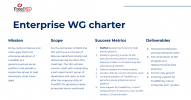From your initial post:
[...] The manual says that major releases (for example, 13.0-RELEASE) will be guaranteed support for 5 years.
I think, when mentioning "The manual", you're referring to the webpage*
FreeBSD Security Information:
[...]
The FreeBSD support model
Under the current support model, each major version’s stable branch is explicitly supported for 5 years, while each individual point release is only supported for three months after the next point release.
The details and rationale behind this model can be found in the official announcement sent in February 2015.
Based solely on this quoted text, I can understand that you might conclude you'd want/need a stable version, especially when used to (very) different Linux support models.
As mentioned, the announcement from 2015 about the changed support model gives detailed information. However, IMO, the quoted abstract on the web page could benefit from a little more explanation**. My attempt:
---
The FreeBSD support model
The current branch is a development branch, FreeBSD versions that come from this branch are not supported.
For each FreeBSD major version there is a related stable branch that is explicitly supported for 5 years. That stable branch evolves during its lifespan, with minor user impact. A stable version comes from a stable branch, however, a FreeBSD stable version is a development version and generally not considered suitable for a production environment. A supported stable branch is used as the basis for a new point release.
For each supported major version one point release at a time is supported, with one exception. From the moment a new point release is released, the old point release remains supported for a period of three months (an overlap intended to plan and ease the administration of the upgrade of minor versions). When that period ends the old point release has reached its End of Life (EoL) and is no longer supported.
The details and rationale behind the FreeBSD support model can be found in the
official announcement sent in February 2015.
---
I think together with the very insightful schematic drawing below from
anlashok***, you have have a compact overview of FreeBSD's branches, versions and support model.
___
* During a quick scan of the FreeBSD Handbook I couldn't find it there.
** I think the (short) abstract creates an apparant stark contrast between the support of a stable branch and a release branch, where in reality it is more nuanced, as
Eric A. Borisch also
mentioned earlier. "supported for 5 years" versus "is only supported for three months after the next point release" used in the same sentence emphasizes this apparant contrast.
***
anlashok has drawn it for the situation at the end of 2022 (Edit: At that time two point releases of a major version were supported—12.3-RELEASE and 12.4-RELEASE). See also
this thread referenced earlier.

